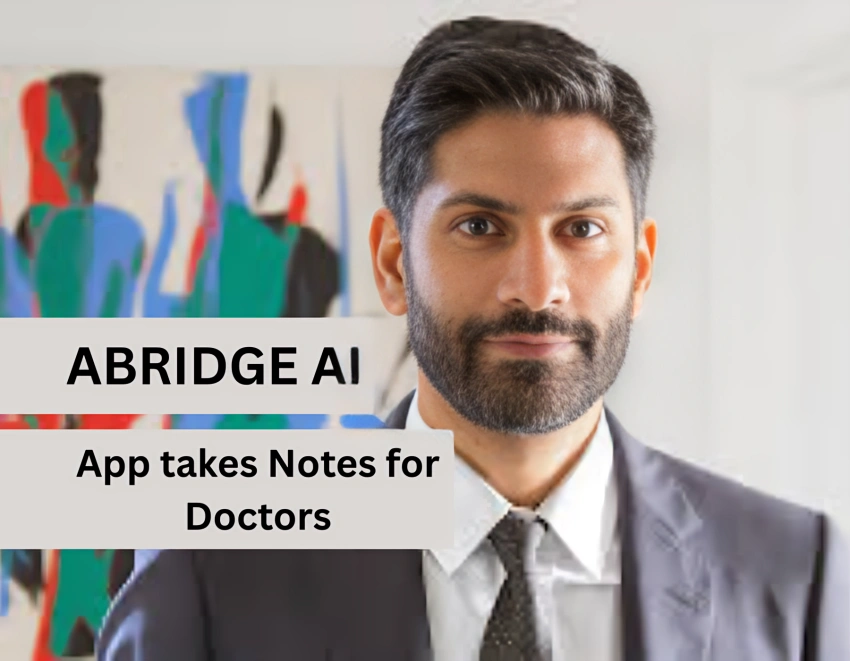Abridge, an AI startup transforming how doctors take notes, just raised $300 million, nearly doubling its valuation in months. Backed by top investors like Andreessen Horowitz and Khosla Ventures, the company is now worth $5.3 billion. Why does this matter? Because it’s changing how healthcare works, one conversation at a time.
Key Takeaways:
- Abridge’s AI listens to doctor-patient conversations and auto-generates clinical notes.
- The company’s valuation doubled in 4 months—from $2.75B to $5.3B.
- Over 150 major health systems now use Abridge across the U.S.
- It aims to support 50+ million medical conversations this year.
- AI reduces burnout: 60–70% of doctors continue using Abridge long-term.
- New funding will accelerate hiring, R&D, and real-time billing code integration.
What Is Abridge?
Imagine being a doctor, juggling 20+ patients a day—and spending hours afterward catching up on clinical notes. Now, picture an AI that “listens” during appointments, auto-generates the necessary documentation, and even fills out medical billing codes. That’s what Abridge offers.
Founded in 2018 by cardiologist Dr. Shiv Rao, Abridge uses ambient AI technology to record, transcribe, and summarize clinical conversations in real-time. It’s already live in over 150 large health systems, a leap from a few pilot sites just a couple of years ago.
The Power Behind the $5.3B Valuation
Funding Details
The latest $300M raise—led by Andreessen Horowitz with help from Khosla Ventures—will fund Abridge’s efforts to scale:
- Hiring AI researchers, engineers, and software developers.
- Enhancing infrastructure to support millions of real-time sessions.
- Embedding automated medical coding into transcripts.
This follows a $250M raise just four months ago, which valued the company at $2.75B. With this latest round, Abridge has officially entered the AI healthcare unicorn club.
How It Works: Real-Time Note-Taking for Doctors
Abridge uses ambient listening AI, meaning it can pick up conversations between doctors and patients without manual input. The tool transcribes the dialogue, highlights key points, and generates specialty-specific notes.
What makes it accurate?
The AI is trained to recognize complex, hard-to-pronounce medical terms and can access a patient’s past records to customize each report to the doctor’s preferences.
What’s new?
The latest upgrade integrates billing code validation in real-time, automating the documentation process and helping reduce human error in insurance claims and audits.
Real-World Adoption: Doctors and Nurses Already Using It
Yale New Haven Health System
Out of 3,000 employed doctors, 800 are currently using Abridge—a number expected to double in the next year, according to Dr. Lee Schwamm, their Chief Digital Health Officer. Among users, 60–70% stay with the platform, citing reduced burnout and more patient-focused time.
“We’ll soon require all doctors to use Abridge, just like electronic health records,” says Dr. Schwamm.
Inova Health System
In Northern Virginia, Inova is expanding Abridge access from its 2,000 doctors to include 6,000 nurses. Soon, nurses will carry Abridge-connected devices, checking vitals and documenting patient data hands-free.
Why Burnout Is Driving Adoption
Physician burnout is at a crisis level. According to a 2023 Mayo Clinic study, 63% of U.S. doctors report emotional exhaustion linked to documentation burden. AI tools like Abridge cut down after-hours note-taking, letting doctors spend more time with patients—and less time on screens.
What About Data Privacy?
As with any healthcare AI, privacy is a hot topic. Matt Kull, Inova’s Chief Digital Officer, emphasizes that the system is assistive—not autonomous.
“AI should prompt and support, not replace human decisions,” Kull says.
Abridge complies with HIPAA regulations, and hospitals retain control over all data.
The Competitive Landscape: A Sizzling Sector
Abridge isn’t alone. The “AI medical scribe” space is heating up fast:
- Microsoft acquired Nuance in 2022.
- Startups like Suki AI, Ambience Healthcare, and Nabla are chasing similar goals.
But Abridge’s speed of adoption, deep clinical integration, and real-time billing feature give it a major edge.
What’s the Next step to Abridge?
With 50 million+ conversations projected this year, Abridge is preparing for massive growth. The company plans to:
- Expand internationally
- Improve multilingual support
- Personalize AI notes further using clinician feedback
- Strengthen audit and compliance tools
As AI evolves, so will the role of ambient tech in healthcare—less paperwork, more patient care.
